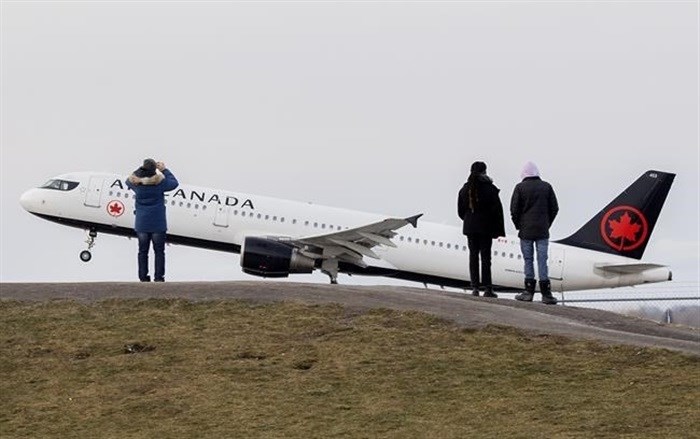
People look on as an Air Canada plane takes off from Montreal Trudeau Airport in Montreal, Sunday, Dec. 5, 2021. Confusion is the defining state for many Canadians contemplating travel this month amid shifting advice, COVID-19 variants and layers of testing and quarantine rules.
Image Credit: THE CANADIAN PRESS/Graham Hughes
December 13, 2021 - 7:00 PM
MONTREAL - Confusion is now the defining state for many Canadians considering travel this month amid shifting advice, COVID-19 variants and layers of testing and quarantine rules.
The prospect of flying abroad is "incredibly confusing" as passengers remain uncertain about whether they will be tested at airports upon return or forced to quarantine — on top of the gamut of measures in other countries — said Marty Firestone, president of Toronto-based insurer Travel Secure.
"What do I need to get into that country? What do I need to get in this country? What do I need to get back into my own country?" he asked, paraphrasing client questions.
Many are now rerouting trips or cancelling altogether out of exasperation, Firestone said.
"We're just in a disarray, there's no other simple way to put it."
COVID-19 testing is one area where uncertainty abounds.
The federal government has said all passengers entering Canada, except those from the United States, need to be tested on arrival and isolate until they get their results. (Those coming from 10 African countries face further restrictions following initial detection of the Omicron variant in South Africa, despite its prevalence in more than 50 countries.)
But federal Health Minister Jean-Yves Duclos acknowledged Friday that Canadian airports do not yet have the capacity to fully test all non-U.S. international arrivals. He did not say when that could realistically begin, though random tests for returning overseas passengers are now underway.
“It’s going to be mayhem and utter chaos at the airports once people return to Canada," Firestone predicted.
"Will they be herded into an assembly hall with 1,000 other people? Be left on the plane until the terminal gets empty enough to bring in the next 1,000 people? Or will they be handed a take-home test?" he asked.
Travellers also have to figure out testing requirements in other countries. A negative result from a rapid antigen or PCR test taken the day of or the day before departure is required to enter the U.S.
Molecular tests, which include PCR tests — but not rapid antigen tests — are acceptable for return to Canada if vaccinated residents want to avoid quarantine. Travellers have up to 72 hours before takeoff or border crossing for the trip home to get the nasal swab, though many pharmacies offer no time guarantees.
Then again, if the trip is less than 72 hours, fully vaccinated flyers and road-trippers need not get tested after all.
"Complete confusion," said John McKenna, CEO of the Air Transport Association of Canada. "Even we have calls with the Department of Transport, and they don't have the answers."
He said the federal government needs to communicate guidance more clearly as thousands of Canadians start to call off holiday trips.
For example, the federal government’s travel advisory website does not rank countries by their COVID-19 risk, unlike the U.S. Centers for Disease Control and Prevention.
Duclos said Friday that those planning to travel in the next few weeks should expect delays and hassle at the airport, and be aware that the situation could suddenly worsen.
"If they're thinking of travelling, (Omicron) should be a serious alarm bell, a serious concern for them," he told reporters. "It's going to be uncertain and risky."
Ottawa has not reimposed an advisory against all non-essential travel abroad that it quietly lifted on Oct. 21, but it warns Canadians to "exercise extra caution" as the Omicron variant spreads.
"Everyone's very upset," McKenna said, citing a lack of genuine consultation with industry.
"We're not saying that the government is not taking this seriously," he added. "We're saying the government needs to be better organized and communicate better."
On airport screening, Duclos said as of Nov. 30 airports could administer 11,000 COVID-19 tests per day and that number has risen to 17,000 a day.
Full capacity would be 23,000 daily tests, and Duclos did not specify when that would occur.
He also announced that 35 million rapid tests will be delivered to provinces and territories this month, though questions remain around the breadth of their deployment.
Air Passenger Rights president Gabor Lukacs said he supports extensive and potentially stringent measures, but said passengers have been fined for refusing airport tests they didn’t realize could be required of them.
“There is a lot of confusion about the law, for sure," he said.
The questions come after an auditor general's report Thursday that found Canada failed to adequately enforce border measures designed to keep international travellers from importing cases of COVID-19 into the country.
The World Health Organization said Thursday it is too early to tell whether Omicron is more transmissible than the Delta variant, though preliminary data suggests the strain may not be as severe as initially feared.
This report by The Canadian Press was first published Dec. 11, 2021.
Note to readers: This is a corrected story. A previous version included erroneous information about testing requirements for Canadians returning from travel abroad.
News from © The Canadian Press, 2021